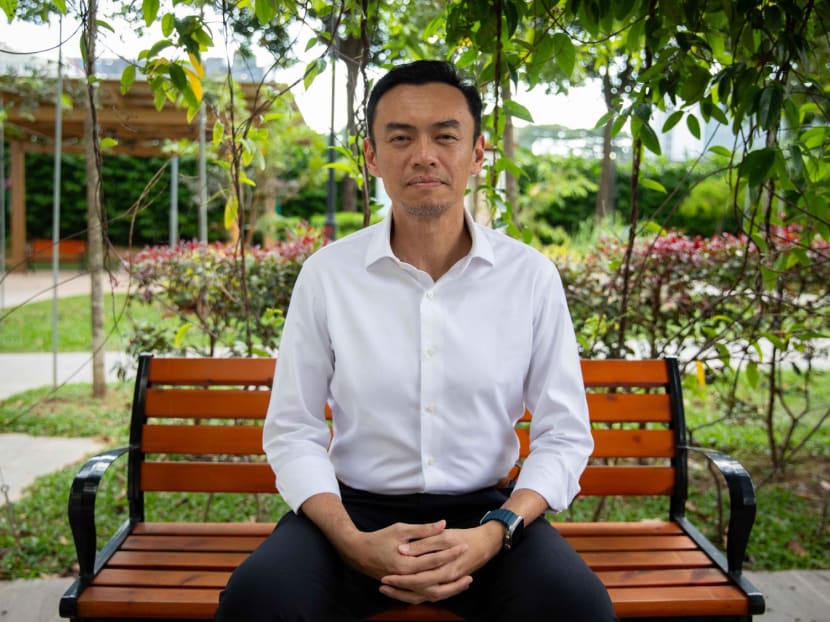He handled suicide calls, his wife had postnatal blues. MP Wan Rizal wants to see 'next frontier' in mental health for Singapore
SINGAPORE — When Dr Wan Rizal Wan Zakariah and his wife had their fourth child in 2017, he thought that he would be better prepared to walk his wife through the throes of postnatal blues.

Dr Wan Rizal Wan Zakariah photographed in Jalan Besar on Feb 2, 2024.

This audio is AI-generated.
- Members of Parliament from the Government Parliamentary Committee for Health has filed a motion to do more to tackle mental health
- It is to call for a whole-of-Singapore effort in advancing mental health and well-being
- Dr Wan Rizal Wan Zakariah from the committee explains why the team has put this up for when Parliament sits the week of Feb 5
- He talked about his personal experience of supporting his wife through her postnatal blues and the importance of having a support network
- His hopes are that mental health screenings will be the norm one day, and that people have strong links to a caring community with shared interests
SINGAPORE — When Dr Wan Rizal Wan Zakariah and his wife had their fourth child in 2017, he thought that he would be better prepared to walk his wife through the throes of postnatal blues.
“You know, having a fourth child means you’re quite an ‘old bird’ already, lah,” the 46-year-old said, using a term that refers to someone who is well-seasoned. His wife is three years younger than him.
“You know that your wife will go through postnatal depression probably, and you’re more or less geared up… you know how to help her out,” he continued.
The Member of Parliament (MP) for Jalan Besar Group Representation Constituency was speaking to TODAY on Friday (Feb 2) before Parliament sits next week.
Her condition then had not been medically diagnosed, he added, but even with some experience and preparation, having their fourth child was an especially difficult period for the couple, because his wife’s postnatal blues lasted for six months — much longer than he had expected.
“And for that whole duration, I think it was quite tough because she was always down. And as much support as I was giving her, I had three other children who also needed their mum.” Their four children are now aged 17, 14, 11 and seven.
“Under pressure” to care for his wife and young children then, Dr Rizal expressed gratitude to close friends to whom he could confide and be heard.
What helped the family through that period was having a community and strong support network, he remembered.
“Although I had to really hold the ship together, I was not alone. I had my parents, I had my in-laws and everybody came in and they became a very strong support system, and that’s why I believe strongly in this.
“If you really want to improve mental health in Singapore, it’s about getting that support network strong.”
This is why, together with four other MPs from the Government Parliamentary Committee (GPC) for Health — Dr Tan Wu Meng, Mr Yip Hon Weng, Ms Mariam Jaafar, and Mr Edward Chia — he has filed a parliamentary motion to call for a whole-of-Singapore effort in advancing mental health and well-being.
“The essence of the motion is a heartfelt call for unity in nurturing a society where mental well-being is a shared journey, emphasising compassion, understanding, and collective action for the holistic health of every Singaporean,” he said.
On why the team had filed the motion, Dr Rizal said that each committee member had their own areas of interest and collectively brought together a “broad kind of expertise”:
“For me, it was mental health and… (Ms Mariam’s) in tune with the nuances of the youth, and mental health comes up quite high on the list. Dr Tan Wu Meng, he’s a doctor, so he’s seen his fair share of mental health issues within the community, too.”
“But if you look across (the board), all of us really believe that mental health is something that is very pertinent… and it has always been an issue deep within our hearts,” he added.
In October last year, the Government launched the National Mental Health and Well-being Strategy, which aims to build up the country’s mental health ecosystem to offer accessible clinical care to people who need it.
Even though Dr Rizal believes that the national strategy is a good move “in the right direction”, strengthening the community element would be a key focus for the GPC for Health, because they are looking to build on the national plan.
“I’m glad that we are all moving in the right direction... it’s all about just refining it. I think the key word I want to use for our motion is that we want to refine. It’s not about revamping a strategy,” he said.
Referring to the 2012 Community Mental Health Masterplan and the 2007 National Mental Health Blueprint that came before the latest national strategy, Dr Rizal added: “We always, in a way, refresh and update (our approach) simply because of the way our community changes over time, and the nuances need to be adapted accordingly.
“And for us (in the GPC), many of us have been speaking about this for the longest time, and I thought it was timely that the strategy came out and we are able to further the strategy’s plans.”
During the interview, apart from talking about the motion the GPC had filed, Dr Rizal also spoke about his motivations for being a long-time advocate for mental health.
Recounting the period when his wife was experiencing postnatal depression after they had their fourth child, Dr Rizal recalled two things they did when his wife was struggling: He taught his three older children to help support their mother, aside from relying on an external network of family and friends for support.
'EYE-OPENING' EXPERIENCE
Dr Rizal told TODAY that what really got him interested in the sphere of mental health and well-being was when he was an officer in the Singapore Civil Defence Force (SCDF) during his National Service days.
Attending to suicide calls as an SCDF officer was an “eye-opener” for him, and it made him more cognisant of mental health conditions and how people wanted to be heard.
Since becoming a parliamentarian in 2020, he has spoken extensively about mental health and well-being, often defaulting to the acronym “LAST”, short for literacy, accessibility, screening and time-outs.
“If someone were to fall, we know how to provide first aid for the cut, right? You wash, then you put some ointment, and maybe you put a plaster over it.
“But what if your friend, someone close to you, has a mental health issue that you probably need first aid for and we don’t have that capability?”
How society is going to construct that first aid, is an area to delve deeper into, he said.
Some key hurdles that remain in advancing mental health and well-being in Singapore include overcoming stigma associated with mental health illness, learning to provide support for individuals and their caregivers, and strengthening individuals’ support networks, he added.
WHAT ELSE CAN SINGAPORE DO?
On how Singapore can specifically “go further” in deepening its strategy, Dr Rizal offered some starting points. They include normalising mental health screenings and expanding one’s mental health networks to include a community with shared interests.
“If we can equate physical health screening to mental health screening and we make it a norm, I think that would be my greatest dream come true,” he said.
Just as physical health screenings tell of an ailment or condition, which then allows for directed solutions to be taken to treat it, Dr Rizal hopes that mental health screenings can offer people greater clarity on how they may better their mental health and well-being.
Besides these, he also expressed his hopes for mental health time-outs to be normalised.
He suggested focusing on an added element of “spiritual health”, a topic that emerged in his conversations with the community and engagement sessions with young people.
Noting that spiritual health was one of seven dimensions of wellness in well-being research, Dr Rizal spoke of the importance of having an “all-encompassing” approach to such healthcare.
Emphasising that spirituality was not to be conflated with religious faith even if it could encompass it, he instead likened this aspect of spiritual health to having a “certain direction in life based on a certain set of principles” to help one stay on one’s path.
On strengthening one’s support network, he spoke of expanding this beyond one’s circle of family and friends to also include building a community that has shared interests.
“The next frontier is really that: We need an empathetic community that understands mental health, that supports one another, and provides opportunities and platforms to share openly.
“So one of the things we really feel strongly for is shared spaces — shared safe spaces — and I think it’s very important.”
This may be connecting with others through shared interests in gardening, sports, or the arts, he added.
Ultimately, his hope for the mental health landscape in Singapore is to create a community that is resilient, knowledgeable about mental health literacy and, finally, able to apply this knowledge to help one another.
“And I think the idea is that for those who need help, they’re able to get help without stigma, without fear.”










